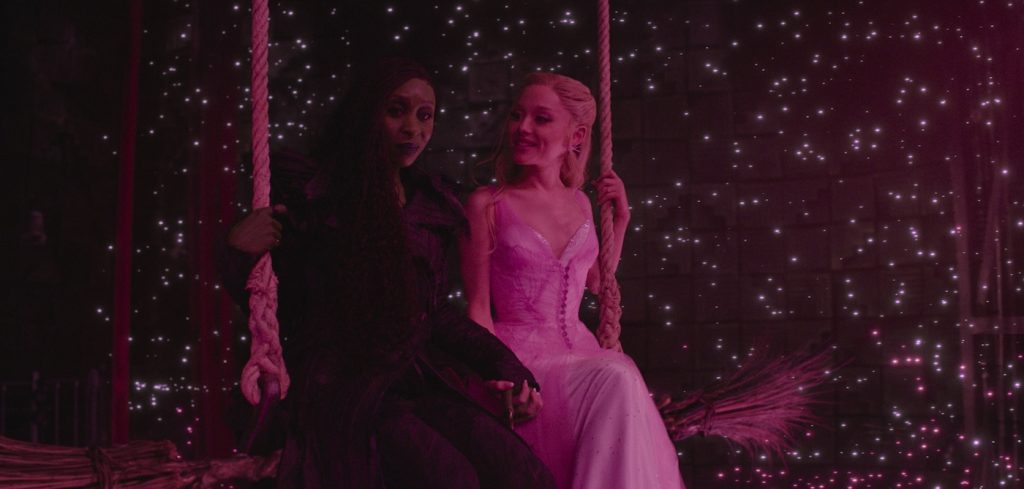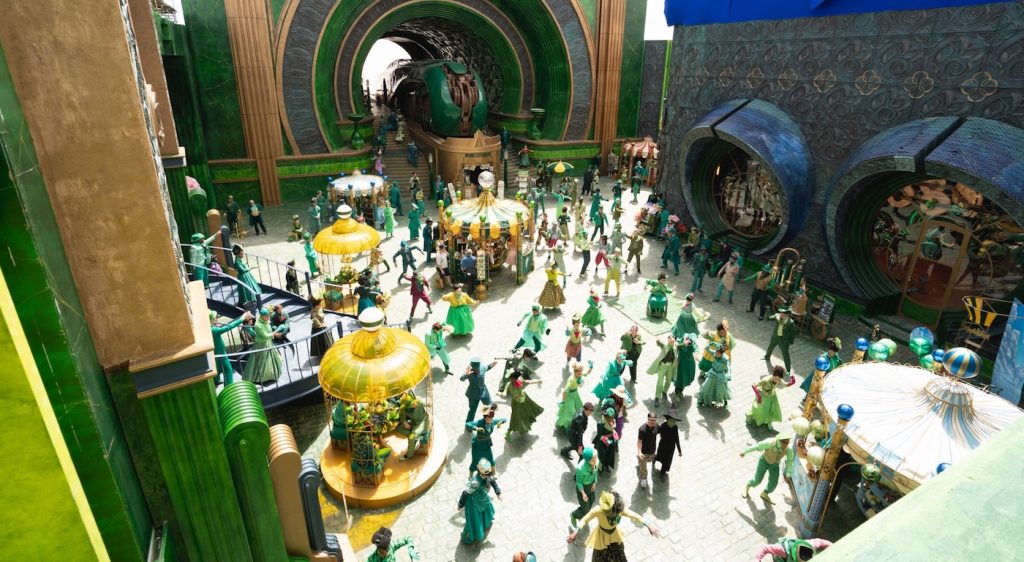“Wicked” and “Wicked: For Good” Screenwriter Dana Fox on Her Magical Musical Theater Homecoming
Screenwriter Dana Fox made a pact with director Jon M. Chu. After working with Chu on her Apple TV+ series, Home Before Dark, she told him she would sign up for a project with him, no matter what, with no questions asked. She was as serious as a witch, if you’ll pardon the pun.
“I told him at the end of that previous job that I will drop anything, anytime for you,” she says. “I don’t care what it is, I want to do it.”
Chu took her up on that offer, calling her to discuss a project he was working on. A big project.
“I said, ‘Okay, yes, the answer is yes,'” Fox recalls. “He said, ‘Don’t you want to know what it is?’ And I was like, ‘No, the answer is yes.”
Fox enrolled in Shiz University, more or less, to adapt the Broadway juggernaut “Wicked” for Chu’s mega-ambitious two-part film. She didn’t just have a greater partner in Chu, but in the woman who first adapted Gregory Maguire’s novel for the stage, Winnie Holzman, who would prove to be an ideal collaborator, unfussy about answering any and all of Fox’s questions and further exploring the world of Oz and the lives, down to the smallest details, of Elphaba (Cynthia Erivo), Glinda (Ariana Grande), and the supporting cast of would-be suitors, nefarious wizards, flying monkeys and more.
We spoke to Fox ahead of her arrival in Washington D.C. for the MPA Awards, in which Chu is receiving this year’s Creator Award, about working with the director and her co-writer, how she approached expanding the world of Oz for the big screen, and more.
So, how did you feel when you realized the project Jon M. Chu was calling you about Wicked?
When he told me it was Wicked, I felt a sense of challenge, which, at this point in my life, is the most exciting thing. When you feel a little nervous because you’re like, ‘Oh, this is going to be kind of an extraordinary challenge,’ it means I’m going to have to step up and up my game.
And you’re working on this with Winnie Holzman, who wrote the book for the musical. How did that collaboration work?
Working with Winnie felt a little bit like the best part of a group project. You know, where you go home and you work on your own stuff, but you’re excited to show the other person because you want to impress them, and they’re going to be excited. There was just this real sense of energy. What I felt was that one of my primary jobs was coming in with fresh eyes. Winnie had lived with these characters for 20-plus years and had created this incredible play. I was able to ask Winnie and composer Stephen Schwartz [a Wicked veteran who worked on the musical] questions that I don’t think they had answered in a very long time about this story and these characters.
What kind of questions?
It was stuff like, ‘Okay, so water kills her?’ and they’d be like, ‘Yeah, listen to the lyric.’ And I would be like, ‘But seriously, can it? Or do people just think it can?’ So it was these weird little nuances that helped me get much more inside the story. And then I spent a lot of time asking them what Elphaba’s magic actually was. Can she do anything besides levitate? Is it only spells? Does she need a spell to do something? Is her magic out of her control in the beginning because she isn’t emotionally in control? That’s the kind of worldbuilding you have to do when you make a really big movie that you don’t necessarily have to do on the stage.
How did Winnie and Stephen respond?
They could not have been nicer about it, and they could not have been more open to thinking about it in ways that they hadn’t thought about it before. They weren’t extraordinarily precious about it, even though they could have been. They were actually really open to having it be something different. A lot of times, that led us into these very long discussions about ‘What if, what if, what if,’ and usually what came out of that was: don’t mess with the stuff that fans care about. Deepen it by creating different avenues that you can take and go to different places and see more about these people than you’ve ever been able to see in the play.
The decision to split this into two films was a big risk. How did that feel?
That was a big swing we were aware of and very excited by. I don’t want to call it terrified, but there was a constant sense of excitement because we were like, ‘This has to work. There is no version of this not working because if the first movie doesn’t work, we have already shot the second one.’ That is a very intense sense of challenge, and I think all of us really enjoyed having to rise to that. I happened to see the second movie recently as a double feature after watching the first, because I wanted to see it that way. By the end of the day, I was like a shell of a person who had to be swept off the floor – makeup all over, mascara, sweating, weeping, joyful, happy, singing. It was all of the emotions.

How is writing a musical screenplay different from writing a regular screenplay?
What was so interesting and fun was mining the lyrics, because the lyrics are never going to change. They’re your preexisting materials. You look at certain lyrics that hit you very deeply emotionally and ask yourself why. Then I would say to the rest of the team, ‘In that moment that lyric creates that explosive feeling inside us, have we seen enough evidence of that to believe that character is feeling that?’
Oh interesting. So you’re reverse-engineering a bit from the lyrics?
One of the things I learned about musical numbers is that the way you stage them—the dancing, where they’re located, what locations they pass through, does the song pass time or does it break linear time—those things are all really important. In a movie theater, every single time someone starts to sing a song, there’s the possibility that person goes to the bathroom because they’re thinking, ‘Nothing’s going to happen during the song, right?’ What I think Wicked did so extraordinarily was we were constantly thinking: how can we make this scene, this song, this number, this dance sequence actually tell a story and say things between characters that you can’t see anywhere else in the movie, and move the story forward in ways that you weren’t expecting?
Were you able to be on set much during production?
This took place in London. I have three kids and there was a large portion of it that took place during the writers’ strike, so I wasn’t allowed to be anywhere. That was a bit of a heartbreak, honestly, because I do think it would have been amazing if we could have been there on set. I was able to visit once and say hello to everybody. When you’re sitting at a computer and your posture when writing is sort of gargoyle-esque, you’re so inside your own head and usually alone. What keeps me going on difficult days is the thought that there’s a group of people who are going to make this real at some point. Stepping on set for Wicked and seeing they had built a town – there was a lake on this set – it was enormous and beautiful. Watching people bring something that was in your imagination to life, with so many people bringing their joy, their creativity, their love and their expertise to bring it to life in the most extraordinary way, was just awesome. That’s what keeps me going in the difficult times – thinking about the fact that I’m lucky enough that someday somebody is going to make this stuff real.

You’ve been a successful screenwriter for years, but this must feel like a new, and very giant, step.
Musical theater was like my team sport growing up. I wasn’t amazing at team sports, so musical theater became my team sport. That’s where I learned that the biggest joy for me is working with other people to create something much better than any one of us could have done on our own. Wicked brought me back to musical theater and absolutely reignited my love of it, my passion for it. Now I can’t imagine a movie where someone doesn’t break into song and start dancing. For the little girl that wanted to do this when she was eight years old, this is like the most beautiful homecoming of all, especially with this particular musical, which is truly so beloved.
What’s it been like working on this with Jon and all your other collaborators?
This is a really difficult time in the business, and to be working and be allowed to work at this level is a real gift, and we know it. I think we try to be happy every day and grateful every day that we get to do this for a job. I cannot believe this is my job. Sometimes I say things like, ‘I would do this if I didn’t get paid,’ and my agent calls me and says, ‘Please don’t say that. Please stop saying that in the press.’ We do all really love each other. I’ve worked with several of the team members on other things, and they’re the people that I wish I could have come home to after school when I was a little kid and made plays with in my basement. The fact that we get to do it on this level is extraordinary.
Featured image: L-r: US screenwriter Dana Fox attends the Los Angeles premiere of Universal Pictures’ “Wicked” at the Dorothy Chandler Pavillon, in Los Angeles, November 9, 2024. (Photo by VALERIE MACON / AFP); L to R: Cynthia Erivo is Elphaba and Ariana Grande is Glinda in WICKED FOR GOOD, directed by Jon M. Chu.



